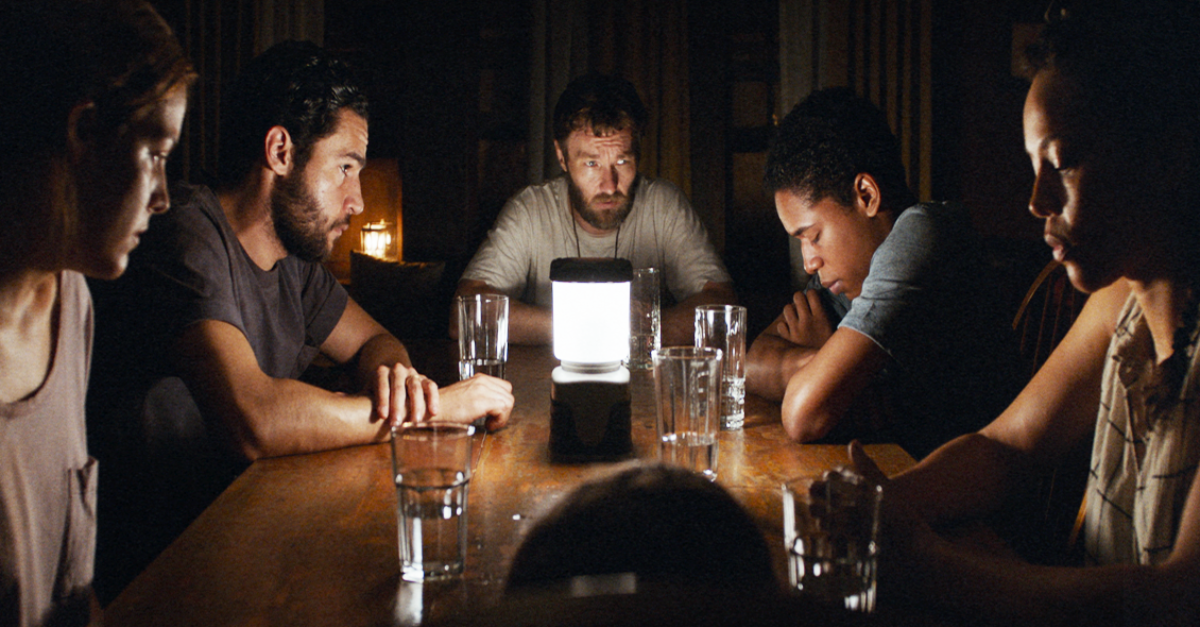
As the world is gripped with the spread of a deadly sickness with no cure, former history teacher Paul (Joel Edgerton) establishes a remote home deep in the woods in order to secure his family, wife Sarah (Carmen Ejogo) and son Travis (Kelvin Harrison Jr.), Soon, a desperate man named Will (Christopher Abbott) arrives seeking help for his own wife and child Kim and Andrew (Riley Keough and Griffin Robert Faulkner). Paul is convinced to let them in but his family’s trust in their new allies is soon put to the test.
While the menace that has shaped the world in this film is a mysterious sickness that has decimated society, It Comes at Night is an examination of the mental sickness that are paranoia and distrust. The constant worry of Paul that Will may turn on his family or bring them harm is the true sickness represented in the film and what the villain really is. Unlike the physically sickness that the characters are hiding from, paranoia may not instantly cause you your life but it will cause you to lose your humanity. Once Paul succumbs to this thematic sickness, he does things that not only turn him into something he wasn’t previously, but grossly affects his entire family.
This theme examining paranoia on the human condition is very timely for our current sociopolitical climate and is one of the strongest portrayals of horror I’ve seen since The Twilight Zone’s legendary The Monsters Are Due on Maple Street episode. It Comes at Night expertly portrays how paranoia slowly alters the perception of those who suffer from it and how it can turn an ordinary, everyday person into a monster that they never thought it was possible they could become and doing things to others that they never thought possible. The realistic terror and fear that results from the actual human condition and psyche is more potent horror than a monster hiding in the woods could ever be. What is scarier than the historically accurate portrayal of mankind’s stubborn inclination to distrust those that they do not know and lash out violently in response? Which scenario is more real and thus more terrifying: a supernatural killer in a hockey mask stalking you in the forest or this? In a time marked by increasing paranoia and calls for violence in response, this film examines the full cost and implications of what that could mean not just for those targeted, but those that engage in such behavior.
It Comes at Night features some of the best use of tension and unspoken conflict in a film in recent memory. The relationship between the two families, even when going well, always carries a sense of dread that keeps the viewer on the edge of their seat. You always can feel that a shoe is about to drop and agonizingly wait for it to do so. Joel Edgerton’s portrayal of a man pushed to his psychological limit in defense of his family is convincing, as is Kelvin Harrison Jr’s portrayal of a young man yearning for normalcy in a world that no longer is. The actors take the understated script full of subtle tension that explodes in the end and perfectly execute the vision and message of the film.
It Comes at Night is a slow burning, intense treatise on horrors that our world encounters everyday rather than imagined horrors that only exist in cinema. Most of the audience rejected such a premise but in times like these, this film’s theme demands examination more than ever.
Image: A24

